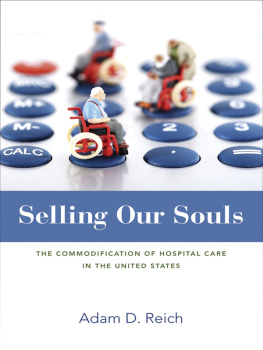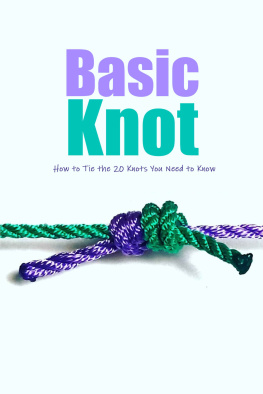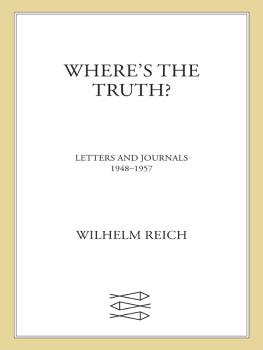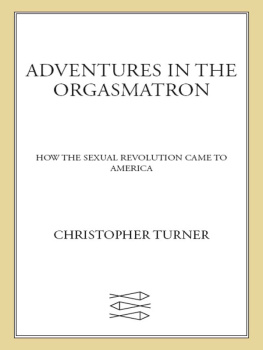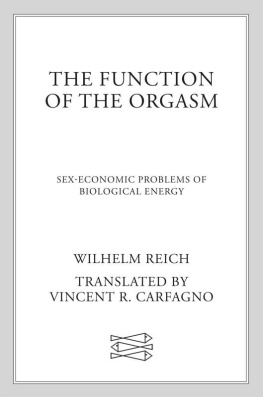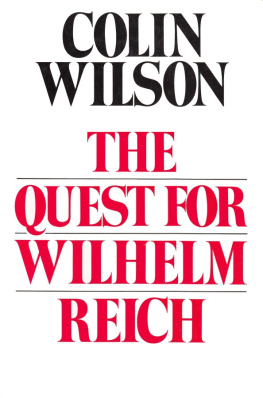Reich - Ether, god & devil & cosmic superimposition
Here you can read online Reich - Ether, god & devil & cosmic superimposition full text of the book (entire story) in english for free. Download pdf and epub, get meaning, cover and reviews about this ebook. City: New York, year: 2013, publisher: Farrar, Straus and Giroux, genre: Science. Description of the work, (preface) as well as reviews are available. Best literature library LitArk.com created for fans of good reading and offers a wide selection of genres:
Romance novel
Science fiction
Adventure
Detective
Science
History
Home and family
Prose
Art
Politics
Computer
Non-fiction
Religion
Business
Children
Humor
Choose a favorite category and find really read worthwhile books. Enjoy immersion in the world of imagination, feel the emotions of the characters or learn something new for yourself, make an fascinating discovery.

Ether, god & devil & cosmic superimposition: summary, description and annotation
We offer to read an annotation, description, summary or preface (depends on what the author of the book "Ether, god & devil & cosmic superimposition" wrote himself). If you haven't found the necessary information about the book — write in the comments, we will try to find it.
Ether, god & devil & cosmic superimposition — read online for free the complete book (whole text) full work
Below is the text of the book, divided by pages. System saving the place of the last page read, allows you to conveniently read the book "Ether, god & devil & cosmic superimposition" online for free, without having to search again every time where you left off. Put a bookmark, and you can go to the page where you finished reading at any time.
Font size:
Interval:
Bookmark:
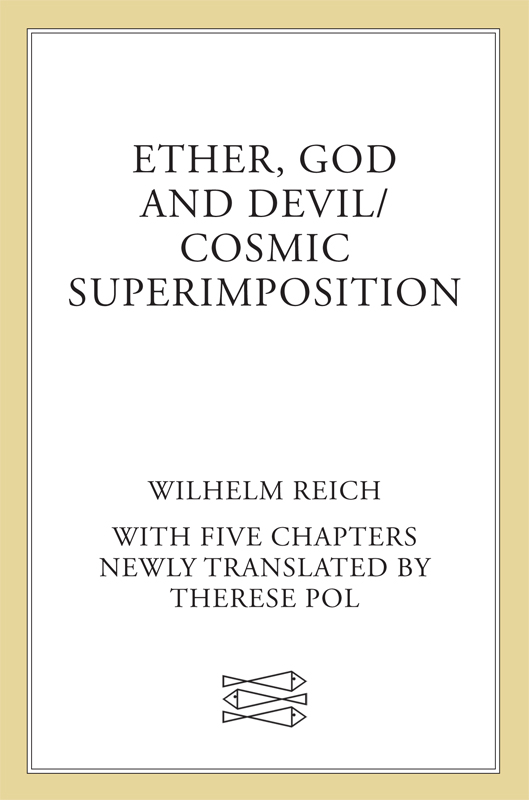

The author and publisher have provided this e-book to you for your personal use only. You may not make this e-book publicly available in any way. Copyright infringement is against the law. If you believe the copy of this e-book you are reading infringes on the authors copyright, please notify the publisher at: us.macmillanusa.com/piracy.
Contents
Love, work and knowledge are the well-springs of our life. They should also govern it.
WILHELM REICH
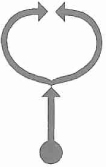
Chapters 14 in Ether, God and Devil and chapter 4 in Cosmic Superimposition have been newly translated from the original German manuscripts by Therese Pol. All other parts of these works were written in English by Reich. In this edition, minor editorial revisions have been made.
Mary Higgins, Trustee
Wilhelm Reich Infant Trust Fund
New York, 1973
ETHER, GOD AND DEVIL
What is the hardest thing of all?
That which seems the easiest
For your eyes to see,
That which lies before your eyes.
Goethe
C HAPTER I
THE WORKSHOP OF ORGONOMIC FUNCTIONALISM
The cosmic orgone energy was discovered as a result of the consistent application of the functional technique of thinking. It was these methodic, rigidly controlled thought processes that led from one fact to another, weavingacross a span of about twenty-five yearsseemingly disparate facts into a unified picture of the function of nature; a picture which is submitted to the verdict of the world as the still unfinished doctrinal framework of Orgonomy. Hence it is necessary to describe the functional technique of thinking.
It is useful not only to allow the serious student of the natural sciences to see the result of research but also to initiate him into the secrets of the workshop in which the end product, after much toil and effort, is shaped. I consider it an error in scientific communication that, most of the time, merely the polished and flawless results of natural research are displayed, as in an art show. An exhibit of the finished product alone has many drawbacks and dangers for both its creator and its users. The creator of the product will be only too ready to demonstrate perfection and flawlessness while concealing gaps, uncertainties and discordant contradictions of his insight into nature. He thus belittles the meaning of the real process of natural research. The user of the product will not appreciate the rigorous demands made on the natural scientist when the latter has to reveal and describe the secrets of nature in a practical way. He will never learn to think for himself and to cope by himself. Very few drivers have an accurate idea of the sum of human efforts, of the complicated thought processes and operations needed for manufacturing an automobile. Our world would be better off if the beneficiaries of work knew more about the process of work and the experience of the workers, if they did not pluck so thoughtlessly the fruits of labor performed by others.
In the case of orgonomy, a look into a corner of the workshop is particularly pertinent. The greatest difficulty in understanding the orgone theory lies in the fact that the discovery of the orgone has solved too many problems at once, and problems that were too vast: the biological foundation of emotional illnesses, biogenesis and, with it, the cancer biopathy, the ether, the cosmic longing of the human animal, a new kind of physical energy, etc. There was always too much going on in the workshop; too many facts, new causal connections, corrections of dated and inaccurate viewpoints, connections with various branches of specialized research in the natural sciences. Hence, I often had to defend myself against the criticism that I had overstepped scientific limits, that I had undertaken too much at one time. I did not undertake too much at a time, and I did not overreach myself scientifically. No one has felt this charge of too much more painfully than I have. I did not set out to trace the facts; the facts and interrelations flowed toward me in superabundance. I had trouble treating them with due attention and putting them in good order. Many, many facts of great significance were lost that way; others remained uncomprehended. But the essential and basic facts about the discovery of cosmic orgone energy strike me as sufficiently secure and systematized for others to continue building the structure I could not complete. The multitude of new facts and interrelations, particularly the relationship of the human animal to his universe, can be explained by a very simple analogy.
Did Columbus discover New York City or Chicago, the fisheries in Maine, the plantations in the South, the vast waterworks, or the natural resources on Americas West Coast? He discovered none of this, built none of it, did not work out any details. He merely discovered a stretch of seashore that up to then was unknown to Europeans. The discovery of this coastal stretch on the Atlantic Ocean was the key to everything that over several centuries became North America. Columbuss achievement consisted not of building America but of surmounting seemingly immovable prejudices and hardships, preparing for his voyage, carrying it out, and landing on alien, dangerous shores.
The discovery of cosmic energy occurred in a similar fashion. In reality, I have made only one single discovery: the function of orgastic plasma pulsation. It represents the coastal stretch from which all else developed. It was far more difficult to overcome human prejudice in dealing with the biophysical basis of emotions, which are mans deepest concern, than to make the relatively simple observation about bions or to cite the equally simple and self-evident fact that the cancer biopathy rests on the general shrinking and decomposition of the living organism.
What is the hardest thing of all? / That which seems the easiest / For your eyes to see, / That which lies before your eyes, as Goethe put it.
What has always astounded me is not that the orgone exists and functions, but that for over twenty millennia it was so thoroughly overlooked or argued away whenever a few life-asserting scholars sighted and described it. In one respect, the discovery of the orgone differs from the discovery of America: orgone energy functions in all human beings and before all eyes. America first had to be found.
An essential and comprehensive part of my activities in the workshop lay in learning to understand why people in general, and natural scientists in particular, recoil from so basic a phenomenon as the orgastic pulsation. Another part of my work, which brought down on me much dirt, dust, and plain garbage, consisted of feeling, experiencing, understanding, and overcoming the bitter hatred, among friends and foes alike, that formed a roadblock everywhere to my orgasm research. I believe that biogenesis, the ether question, the life function and human nature would long ago have been conquered by many scientific workers if these basic questions of natural science had not had but one access: the orgastic plasma pulsation.
When I succeeded in concentrating on this single problem for three decades, mastering it and orienting myself within its fundamental natural function, in spite of all obstacles and personal attacks, I began to realize that I had transcended the conceptual framework of the existing human character structure and, with it, our civilization during the past five thousand years. Without wanting to, I found myself outside its limits. Hence I had to expect that I would not be understood even if I produced the simplest and most easily verifiable facts and interconnections. I found myself in a new, different realm of thought, which I first had to investigate before I could go on. This orientation in the new functional realm of thought, in contrast to the mechanistic-mystical realm of patriarchal civilization, took about fourteen years, roughly from 1932 to the writing of this work, 1946 and 1947.
Font size:
Interval:
Bookmark:
Similar books «Ether, god & devil & cosmic superimposition»
Look at similar books to Ether, god & devil & cosmic superimposition. We have selected literature similar in name and meaning in the hope of providing readers with more options to find new, interesting, not yet read works.
Discussion, reviews of the book Ether, god & devil & cosmic superimposition and just readers' own opinions. Leave your comments, write what you think about the work, its meaning or the main characters. Specify what exactly you liked and what you didn't like, and why you think so.


